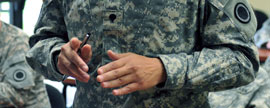Recording Devices and Counseling
This is the first in a series of articles concerning the use of recording devices as they relate to counseling and other situations within today’s military.
Discussion
Over the past year I have been asked numerous times to discuss the likelihood and legality of recording a counseling session between a supervisor and a Soldier. I have had numerous situations and variety of scenarios presented to me through ASKTOP.net and during my travels to conduct book signings and professional development sessions throughout the nation.
I have been hesitant to address the issue for a variety of reasons; specifically I did not want the topic to become a point of discussion that allowed Soldiers to undermine their chain of command. However, after careful consideration and repeated requests, I feel it appropriate to discuss the issue as it appears to be becoming an unspoken issue within our military ranks.
Limited Time Only: Save 10% off all Counseling Products from MentorMilitary.com
Use Coupon Code: COUNSEL 10
So How Did We Get Here in the First Place?
The answer is simple; the average Soldier usually carries on their person a cellular phone, usually a smart phone. These smart phones have the capability to act as a recording device. In addition these devices are relatively concealable, many include video as well as audio capabilities. Other devices are available that disguise recording devices as everyday objects (pens/pencils/clocks) that would not seem out of place in an office setting. Depending on your leadership style, the sensitivity of a subject, and the level of trust that exist between you and your subordinate chances are whether you like it or not if you have not been recorded by one of your subordinates it is likely that you will be recorded in the future.
Is It Legal For a Soldier to Record You?
While the possibility of recording a conversation has been around for a long time it is only within the last decade or so that concealability and portability have made the likelihood of Soldiers recording a conversation a significant possibility. As of the writing of this article I have not seen or reviewed any legal opinions from JAG concerning the legality of a Soldier recording a superior with regard to a counseling session. In my personal opinion there are two schools of thought.
The first says that the event is probably taking place on a military installation which means jurisdiction would most likely fall under federal law. My understanding is that as long as one party of the recording has knowledge of the recording it is legal. There may be cases in which state law may come into play. In some states the law forbids the recording of conversations without both parties being aware the conversation is being recorded.
If a Soldier violates a law by recording a superior, the Soldier can be held accountable for violating a law or regulation. For example, if no electronic devices are allowed in a secure area it would be illegal for a Soldier to record a conversation in this area. Depending on the specifics of the case, it is possible that the Soldier could record illegal or inappropriate action (for example hazing) and that this information could be used to punish the individual responsible for the hazing. It is also probable the commander could use the recording of the information to punish the Soldier who illegally made the recording because they violated a security law.
It is my opinion in a case like this the commander would have the latitude to punish both offenders through non-judicial punishment (Article 15) proceedings under the Uniform Code of Military Justice (UCMJ). However, if these offenses would be taken to a court-martial, Rules of Evidence (ROE), as established by the Manual for Courts-Martial (MCM) apply. Admissibility of such evidence would be determined by the judge presiding over the court martial.
Keep in mind, if an individual is concerned enough to record a conversation, chances are it is a situation that involves one the following possibilities: abuse of a subordinate, abuse of power/privilege, hazing, lack of trust, etc. These issues do not usually rise to the level of courts martial, but are usually left up to a commander to administer and impose punishment. In these cases, the contents of a recording may well be allowable. We will discuss more of the legal aspects of a recording in a separate article.
Can I Order the Soldier Not to Record A Counseling Session or Conversation?
Yes, you can order the Soldier not to record a conversation as long as your order is not illegal. If the Soldier has a right to record the conversation you cannot give the Soldier an illegal order. Therefore if he has the right to record he can do so without fear of retribution. The question here is, “Why would you want to prevent a Soldier from recording a counseling session?”
Why Would a Soldier Want to Record A Counseling Session?
Typically it comes down to one issue-TRUST! If the Soldier or Leader feels they are in a diminished capacity to trust the persons involved or the issue is of such a sensitive or significant nature they feel threatened, they will usually look for ways to protect themselves. In the past, Soldiers would typically ask for a witness to be present during a counseling session in which trust was a factor or the issue was significantly sensitive nature. The new witness is an electronic device that can clearly represent what took place without any ambiguity of the facts.
The Army is currently in the midst of one of the biggest draw downs in its history and is separating Soldiers from service at an alarming rate (2015-2017). We are also seeing headlines concerning toxic leadership and abuse of subordinates. Soldiers that feel abused or believe they are not being treated fairly by their chain of command will take whatever steps they deem appropriate to protect themselves.
After more than a decade of war, long deployments, stress associate with the draw down and the struggle for some borderline Soldiers to maintain their career, there have been several examples of Soldiers losing control and taking inappropriate actions. These actions have included the shooting deaths of two NCO’s conducting a counseling in a combat zone and a Soldier shooting his battalion commander. If Soldiers are willing to turn to violence over counseling and separation issues, then it is reasonable to assume they might take lesser precautions to protect themselves from what they perceive as unfair or inappropriate treatment.
Why Are You Worried About A Soldier Recording A Conversation?
If a Soldier were to tell me they desired to record our counseling session or I later found that our counseling session was recorded, I would more than likely be offended on a personal and professional level. I would most likely view it as a violation of trust, especially if it was done without my prior knowledge. However, if I was asked by the Soldier if they could record the conversation I would allow them providing I got a copy of the recording.
My reasoning is simple. If I am conducting a professional counseling session that is designed to correct and/or educate a Soldier and prevent future substandard performance then I have nothing to worry about. However, if I am a leader who has difficulty controlling my temper, language, and/or I have a tendency to be less than professional then my concern is larger than the question of a Soldier recording a counseling session.
If you are afraid you might say or do something you could later be held responsible for then the Soldier recording the counseling session is not the issue you need to be addressing. You need to focus on addressing your counseling skills and your inability to maintain self-control. The question you must then ask yourself is: “If the roles were reversed would I want to be treated this way?” If the answer is “No” you need to seek assistance in correcting your leadership style immediately.
How Do I Reduce the Risk of A Soldier Recording A Counseling Session?
Obtaining and Maintaining Trust
The best method to reduce the likelihood of a Soldier potentially recording a counseling session is to treat them as you would want to be treated. Treat them in a fair and just manner with dignity and respect regardless of the reasoning for the counseling session (positive or negative). If your Soldiers do not trust you then you have a larger issue at hand.
Seek a Legal Opinion From JAG
The best thing you can do is plan ahead for events like this. Your commander can simply request a legal opinion from your local JAG office. If the legal opinion is favorable to the command in that it states the recording of the conversation must be restricted in some manner then it might be a good idea to post the information on the unit bulletin board if this is a subject that is becoming an issue around your unit.
If on the other hand the JAG opinion comes back and it is not necessarily restrictive I would encourage the commander to share the information will all the leaders in the unit so that they fully understand they could potentially be recorded in a moment containing lapse of judgment, immaturity, or other inappropriate conduct that could not only cause them significant pain but could potentially cost them their career. The bottom line is to conduct yourself at all times like you are being recorded, then you have nothing to worry about.
Ordering the Soldier not Record the Session
In some cases this might be an option as the location may restrict the use of recording devices, however it does not prevent a Soldier from illegally recording the session. It does put the Soldier at a significant disadvantage should they try and use the recording.
Allowing the Recording
If a Soldier states they desire to record the counseling session you might consider simply acknowledging their intent and consider one of several responses:
- Please feel free to do so. I have nothing to hide and this session is designed to develop a plan of action to correct the substandard performance we will be discussing. Perhaps you can use the recording as a method to review your plan of action and ensure it is completed to standard.
- If you feel that is necessary please go ahead. You can record the session as long as you provide me an unedited copy at the completion of our session.
- You can record the session as long as you don’t mind if I record the session as well.
- While I do not mind if you want to record the session I would appreciate it if you would share with me why you see the need to record the session.
For Individuals Who are Working On Their Lack of Self-Contorl:
- I would encourage you to think through all counseling issues before you ever have a discussion with the Soldier.
- I would encourage you not to speak when you are angry!
- I would encourage you to have a witness present when you speak to the Soldier as this will usually assist you in maintaining some level of professionalism.
What is Lost or Gained By Recording?
I would have to say that depends on your situation. If you are truly in a position in which you are confronted with a toxic and abusive leader, the recording of an incident or series of incidents will most likely resolve the issue. Issues like this should be resolved with Leaders being removed from their position. There is absolutely no need to degrade or berate an individual. That is assault; not leadership!
These situations are rare and before a Soldier should consider recording a conversation they should seek to resolve the issue at the lowest possible level using an open dialogue. If it does not work at the lowest level move up the chain of command. If you still feel you are not being treated fairly, seek assistance from JAG and/or the IG before you choose to record someone. This ensures you understand the legal areas associated with your actions.
I would say 98% of all leadership issues boil down to trust or lack of trust. If you are considering recording one of your leaders because you cannot trust them perhaps the best route would be to try and understand why you have difficulty trusting the Leader. Is it possible this lack of trust can be overcome? How do you feel about recording the individual? Do you see it as absolutely okay because the Leaders actions are illegal, unethical, immoral, or, unsafe? Or do you view it as something that is under handed and dirty? If you view it as underhanded and dirty it is most likely not the professional route to take.
Our character is measured not by how we respond when times are good but how we behave when times are tough and our morals are challenged. Are your actions motivated by what is right and just or by revenge or another unprofessional characteristic? In the end only you can decide and you must live with the decisions you make. Before you chose to record, seek legal guidance and then ask yourself if the roles were reversed would I want the Soldier to treat me in the same manner I as I am treating them.














